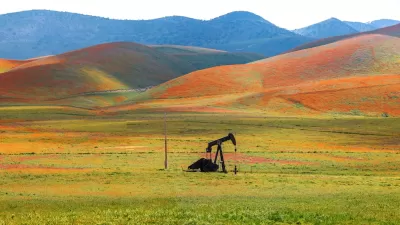For political, technological, and even demographic as well as economic reasons, don't expect American oil consumption to increase over 2007 levels. $3 gas is here to stay, and the days of the petrol-gulping SUVs and guzzlers may be numbered.
Last month's clunkers program, which saw nearly 700,000 guzzlers averaging 15.8 mpg exchanged for vehicles that were 58% more fuel efficient (25 mpg) was a sign of what's in store for the auto and petroleum industry.
"U.S. gasoline consumption fell more than 7% from its 2007 peak in the first quarter...Yes, that in part reflects the effects of the punishing economic downturn. But the slump actually has masked the beginning of a profound, long-term shift that will affect oil and auto stocks for years.
Thanks to a confluence of factors -- a legislative push to wean the nation off foreign oil, an end to very cheap fuel, a global rush toward fuel-efficient cars, fewer people driving to work and more citizens becoming concerned about the environment -- U.S. gasoline consumption might never surpass the high of the summer of 2007, when we guzzled 400 million gallons a day.
Unfortunately for U.S. drivers, $3 or more might be the new norm."
Barron's senior editor, Kopin Tan explains this phenomenon in a short video at the base of the article.
Editor's Note: Access to entire article may be time-limited.
Thanks to Mark Boshnack
FULL STORY: Drip, Dripping Away

Maui's Vacation Rental Debate Turns Ugly
Verbal attacks, misinformation campaigns and fistfights plague a high-stakes debate to convert thousands of vacation rentals into long-term housing.

Planetizen Federal Action Tracker
A weekly monitor of how Trump’s orders and actions are impacting planners and planning in America.

In Urban Planning, AI Prompting Could be the New Design Thinking
Creativity has long been key to great urban design. What if we see AI as our new creative partner?

King County Supportive Housing Program Offers Hope for Unhoused Residents
The county is taking a ‘Housing First’ approach that prioritizes getting people into housing, then offering wraparound supportive services.

Researchers Use AI to Get Clearer Picture of US Housing
Analysts are using artificial intelligence to supercharge their research by allowing them to comb through data faster. Though these AI tools can be error prone, they save time and housing researchers are optimistic about the future.

Making Shared Micromobility More Inclusive
Cities and shared mobility system operators can do more to include people with disabilities in planning and operations, per a new report.
Urban Design for Planners 1: Software Tools
This six-course series explores essential urban design concepts using open source software and equips planners with the tools they need to participate fully in the urban design process.
Planning for Universal Design
Learn the tools for implementing Universal Design in planning regulations.
planning NEXT
Appalachian Highlands Housing Partners
Mpact (founded as Rail~Volution)
City of Camden Redevelopment Agency
City of Astoria
City of Portland
City of Laramie





























